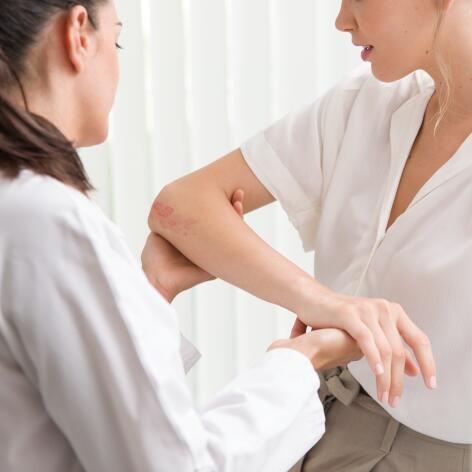How to treat psoriasis
- Living with eczema and psoriasis
- Living with eczema and psoriasis: Children
- Psoriasis and eczema in children: suitable hygiene
- Psoriasis and adult eczema - rules for moisturizing
- Psoriasis and eczema for children - rules for moisturizing
- Living with eczema and psoriasis: Adult
- Adults - Care and anti-itching tips
- Children - Care and anti-itching tips
- Psoriasis and eczema in adults: suitable hygiene
How to treat psoriasis
Psoriasis is a chronic, unpredictable and tough disease. But it’s possible to relieve the itching and dryness of the skin, to prevent the risk of relapse. In short, to control and space out the outbreaks. Let's take a look at these solutions that can change your life!

A treatment adapted to YOUR psoriasis
Each patient has their own treatment, adapted according to several criteria: the severity of the disease, the area affected, their lifestyle and the impact of the disease on their daily life. Certain contraindications and family history may also influence the choice of treatment strategy. A relationship of trust with your doctor is therefore essential. This treatment personalisation is essential for the best possible relief of your psoriasis and to improve your quality of life.
FRIENDLY (AND EXPERT) ADVICE
"Therapeutic management is based on the use of localised treatments in mild and slightly debilitating forms, which can be combined with [drugs] reserved for moderate to severe forms".
www.dermato-info.fr, French Society of Dermatology
Complementary approaches to treating psoriasis
The first step in treating psoriasis is to avoid triggers: depending on the case, it may be the sun, stress, etc. Your dermatologist will offer you alternating flare-up treatment and lighter maintenance treatment phases. In the flare-up phase, localised treatments are prescribed: dermocorticoids and/or vitamin D3 analogues. In the event of resistance to the latter, general medicines (retinoids, methotrexate, ciclosporin, apremilast) are used. Phototherapy is used to whiten skin lesions. Sessions are held three times a week for two months. Appropriate make-up, spa treatments, regular medical follow-ups, psychological care and relaxation also improve your experience of the disease.

Where do moisturizing products fit in?
Emollients to soften and pamper your skin.
Emollients reduce skin dryness (xerosis), soothe inflammation and calm your itching (pruritus). They are very useful for patients whose treatments dry out the skin (oral retinoids and PUVA therapy).
These moisturisers are used during flare-ups in combination with localised treatments. These emollients should be applied on a daily basis for the best possible effectiveness in the treatment of psoriasis!
FRIENDLY (AND EXPERT) ADVICE
Treat your child's psoriasis properly
Although it’s rare, children can develop psoriasis. It's important to prevent your child's skin from drying out by gently and regularly moisturizing. Choose soap-free gels and pH-neutral products. These respect the hydrolipidic film and dry up the epidermis. Another tip is to make sure that the water in your child's shower or bath is lukewarm. Hot water promotes skin dryness and activates inflammation, and therefore psoriasis. Psychological support is also recommended for children to limit the impact on their well-being.

Cold, sun... advice for resistant skin!
To protect your skin from external aggressions:
- Limit the time spent in the shower to 5-10 minutes. If the water is too hard, it will dry out the skin, so use gentle hygiene products without soap.
- After the shower, apply an emollient product. Choose fragrance-free moisturizing products developed for sensitive skin.
- The sun can be beneficial, but it can also be harmful. Applying a sun cream will also protect your skin, especially if psoriasis affects your face.
Our solutions to take care of your psoriasis
Eau Thermale Avène products designed to soothe your atopic skin:
- Avène Thermal Spring Water Spray
Thermal Spring Water
Avène Thermal Spring Water SpraySoothes - Restores the skin barrier - Calms
Which skin care routine should you adopt?
Identify what it really needs with the help of our experts and discover the most suitable skin care routine for you.

